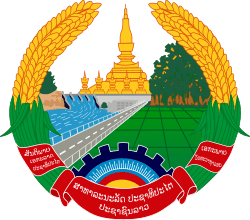Lao People's Armed Forces
| Lao People's Armed Forces | |
|---|---|
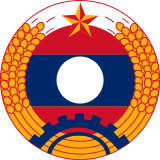 Emblem of Lao People's Armed Forces | |
| Founded | 1975 |
| Service branches |
Lao People's Army (includes Lao People's Navy) Lao People's Air Force[1] |
| Headquarters | Vientiane |
| Leadership | |
| Commander-in-Chief | Bounnhang Vorachith |
| Minister for Defence | Lieutenant General Sengnuan Xayalath |
| Manpower | |
| Military age | 17 years of age for compulsory military service; conscript service obligation - minimum 18 months (2004) |
| Available for military service |
1,500,625 males, age 15–49 (2005 est.), 1,521,116 females, age 15–49 (2005 est.) |
| Fit for military service |
954,816 males, age 15–49 (2005 est.), 1,006,082 females, age 15–49 (2005 est.) |
| Reaching military age annually | (2005 est.) |
| Active personnel | 29,100 (ranked 85th) |
| Expenditures | |
| Budget | $55 million (1996-97) |
| Percent of GDP | 0.5% (2006) |
| Industry | |
| Foreign suppliers |
|
| Related articles | |
| History |
First Indochinese War |
| Ranks | Military ranks of Laos |
The Lao People's Armed Forces (LPAF) is the name of the armed forces of the Lao People's Democratic Republic and the institution of the Lao People's Revolutionary Party, who are charged with protecting the country.
Leadership
- Commander-in-chief: Bounnhang Vorachith
- Defense Minister: Lieutenant General Sengnuan Xayalath
- Chief of General Staff: Lieutenant General Suvon Luongbunmi
Active forces
The army of 29,100 is equipped with 30 main battle tanks. The army marine section, equipped with 16 patrol craft, has 600 personnel. The air force, with 3,500 personnel, is equipped with anti-aircraft missiles and 24 combat aircraft (no longer in service).
Militia self-defence forces number approximately 100,000 organised for local defence. The small arms utilised mostly by the Laotian Army are the Soviet AKM assault rifle, PKM machine gun, Makarov PM pistol, and the RPD light machine gun.
History
Until 1975, the Royal Lao Army were the armed forces of the Kingdom of Laos.
Serving one of the world's least developed communist countries, the Lao People's Armed Forces (LPAF) is small, poorly funded, and ineffectively resourced. Its mission focus is border and internal security, primarily in internal suppression of Laotian dissident and opposition groups.[1]
This includes the brutal crushing of the peaceful 1999 Lao Students Movement of Democracy demonstrations in Vientiane, and in countering ethnic Hmong insurgent groups and other groups of Laotian and Hmong people opposing the one-party Marxist Pathet Lao government and the support it receives from the Socialist Republic of Vietnam.[1]
Together with the Lao People's Revolutionary Party and the government, the Lao People's Army (LPA) is the third pillar of state machinery, and as such is expected to suppress political and civil unrest and similar national emergencies faced by the authoritarian, communist government in Vientiane. The LPA also has reportedly upgraded skills to respond to avian influenza outbreaks. At present, there is no major perceived external threat to the state and the LPA maintains very strong ties with the neighbouring Vietnamese military (2008).[1]
Tanks and armoured vehicles
| photo | Name | Type | Origin | Quantity | Notes |
|---|---|---|---|---|---|
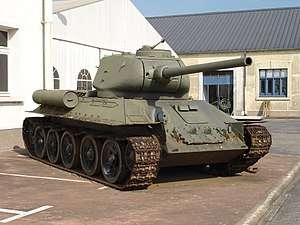 | T-34 - 85 | Medium Tank | 10[2] | ||
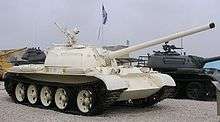 | T-54/55 | Main Battle Tank | 15[2] | ||
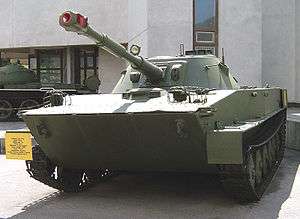 | PT-76 | light tank | 10[2] | ||
| BTR-60P | Armored Personnel Carrier | ||||
| BTR-152 | 20[2] | ||||
Artillery
| photo | Name | Type | Origin | Quantity | Notes |
|---|---|---|---|---|---|
 | M-30 122 mm howitzer | towed howitzer | ~10[2] | ||
.jpg) | 122 mm howitzer 2A18 (D-30) | ~10[2] | |||
 | 130 mm towed field gun M1954 (M-46)[3] | 10[2] | |||
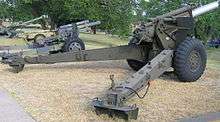 | M114 155 mm howitzer[3] | 12[2] | |||
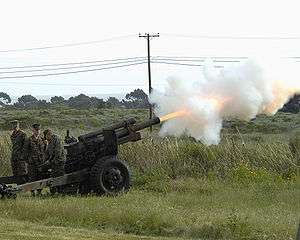 | M101 howitzer | 105mm (towed): M-101[3] | 20[2] | ||
 | M116 howitzer[3] | 75mm (towed): M-116 pack | - | ||
Air defence
| photo | Name | Type | Origin | Quantity | Notes |
|---|---|---|---|---|---|
| Strela 2 | Surface-to-air missile | ||||
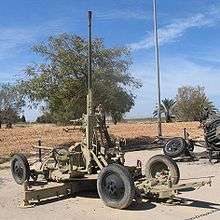 | 37 mm automatic air defence gun M1939 (61-K) | Air defence gun | |||
 | 57 mm AZP S-60 | Automatic anti-aircraft gun | |||
.jpg) | ZPU | auto anti-aircraft gun | |||
 | ZU-23-2 | anti-aircraft gun | |||
Mortars
Human rights violations
According to numerous independent journalists and non-governmental organisations (NGOs), including Amnesty International, Human Rights Watch, The Centre for Public Policy Analysis, Lao Human Rights Council, United League for Democracy in Laos and humanitarian and human rights organisations, the Lao People's Army has repeatedly engaged in egregious human rights violations and the practice of corruption in Laos.[7][8]
Human rights violations committed by the Lao military include kidnapping, rape, torture, extrajudicial killing, military attacks against civilians, mass starvation against the ethnic minority, Hmong people, illegal logging in co-operation with the Vietnam People's Army-owned front companies and other violations of international law, the Geneva conventions, and acceptable norms of behaviour. According to a report by Amnesty International in 2007: "Thousands of ethnic Hmong women, men and children live in scattered groups in the Lao jungles, hiding from the authorities, particularly the military. Amnesty International is calling for an immediate end to armed attacks on these people."[7][8]
In 2013, attacks by the Lao People's Army against the Hmong people and others intensified, with soldiers killing four unarmed Hmong school teachers in addition to engaging in other human rights abuses according to the Lao Human Rights Council, the Centre for Public Policy Analysis and others.[9] The LPAF and its military intelligence play a major role in the arrest, imprisonment and torture of foreign prisoners in Vientiane's notorious Phonthong Prison and the communist Lao gulag system where Australians Kerry and Kay Danes were imprisoned and where civic activist Sombath Somphone may be imprisoned following his arrest in December 2012.[10]
Laotian and Hmong veterans who fought against North Vietnam, Vietnam People's Army (VPA), communist Pathet Lao forces, and LPAF to defend the Kingdom of Laos and US, Laos and the Kingdom of Thailand's national security interests during the Vietnam war and its aftermath, including the Lao Veterans of America, established the Laos Memorial in Arlington National Cemetery in 1997.
The United League for Democracy in Laos, Amnesty International, the Centre for Public Policy Analysis, the Lao Veterans of America and other NGOs continue to raise concerns about the LPAF's serious human rights violations, internal suppression of the population, systemic corruption, brutal attacks against unarmed Laotian and Hmong political and religious dissident and opposition groups, one-party authoritarian rule in Laos as well as the LPAF's very close relationship with the VPA and VPA military-owned companies engaged in illegal logging in Laos.[11]
Organisations
- Amnesty International
- The Centre for Public Policy Analysis The Centre for Public Policy Analysis, Washington, D.C.
- Laos Memorial, Memorial to Lao and Hmong Veterans who fought against Lao People's Army and Pathet Lao during Vietnam, Arlington National Cemetery, USA,
- Lao Veterans of America, Inc., Lao and Hmong Veterans who fought against Lao People's Army, Pathet Lao and North Vietnam during the Vietnam War.
See also
References
- 1 2 3 4 "The World Factbook — Central Intelligence Agency". www.cia.gov.
- 1 2 3 4 5 6 7 8 9 10 "Laos Army Equipment". Global Security. Retrieved 18 January 2018.
- 1 2 3 4 John Pike. "Laos Army Equipment". Retrieved 22 October 2014.
- ↑ John Pike. "World Military Guide". Retrieved 22 October 2014.
- ↑ "Laos". Retrieved 22 October 2014.
- 1 2 3 4 "Library of Congress / Federal Research Division / Country Studies / Area Handbooks / Laos / Tables". Retrieved 22 October 2014.
- 1 2 Amnesty International, (23 March 2007), "Lao People's Democratic Republic: Hiding in the jungle - Hmong under threat" "Archived copy". Archived from the original on 8 December 2014. Retrieved 4 December 2016.
- 1 2 The Centre for Public Policy Analysis, CPPA, Washington, D.C. (1 August 2013), http://www.centerforpublicpolicyanalysis.org
- ↑ Businesswire, businesswire.com (4 March 2013) "Laos: Attacks Intensify Against Lao, Hmong People" http://www.businesswire.com/news/home/20130304006755/en/Laos-Attacks-Intensify-Lao-Hmong-People
- ↑ Scoop Independent News, Auckland, New Zealand, (19 March 2013) "Laos Officials Criticized for Obstructing Investigation" http://www.scoop.co.nz/stories/WO1303/S00169/laos-officials-criticized-for-obstructing-investigation.htm
- ↑ Lao Veterans of America, Inc. (LVA), (29 August 2013), http://www.laoveteransofamerica.org
.svg.png)
